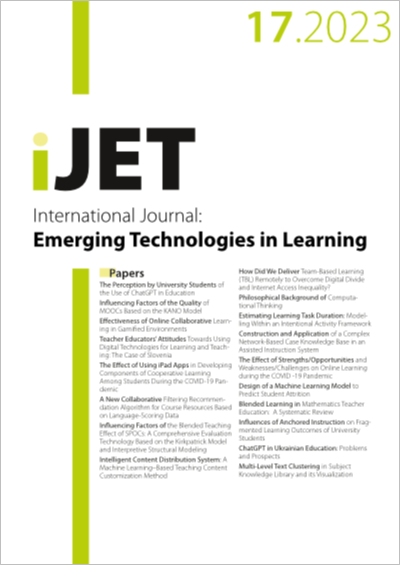A New Collaborative Filtering Recommendation Algorithm for Course Resources Based on Language-Scoring Data
DOI:
https://doi.org/10.3991/ijet.v18i17.43485Keywords:
language scoring data, sentence similarity, automatic language scoring, collaborative filtering, course resource recommendation, personalized learning, educational techniquesAbstract
As digital tools and online resources are widely used in education these days, providing students with personalized learning resource recommendations is now an important task for educators- however, the currently available recommendation algorithms created based on language-scoring data are deficient in aspects of sentence similarity calculation and students’ acceptance of new knowledge, so this study proposed an automatic language-scoring method based on the improved sentence similarity calculation; then, combining with the language-scoring data of students, a new collaborative filtering recommendation algorithm of course resources was proposed for changes in the effect of students’ acceptance of new knowledge. The proposed new algorithm can more accurately evaluate students’ language ability, with students’ interests and capacity taken into consideration, and it can give more suitable and personalized recommendations of learning resources for students. In terms of algorithm design, both efficiency and accuracy have been taken into account and balanced, so the algorithm is applicable to large-scale data processing and real-time recommendation. This study not only helps in improving students’ learning effect, but also provides useful references for educational institutions to optimize course design and teaching methods. Research findings of this study can be used in other disciplines and fields as well.
Downloads
Published
How to Cite
Issue
Section
License
Copyright (c) 2023 Nan Zhang (Submitter); Jiao Song, Ru Wang, Xin Zhao, Mingli Gao

This work is licensed under a Creative Commons Attribution 4.0 International License.



